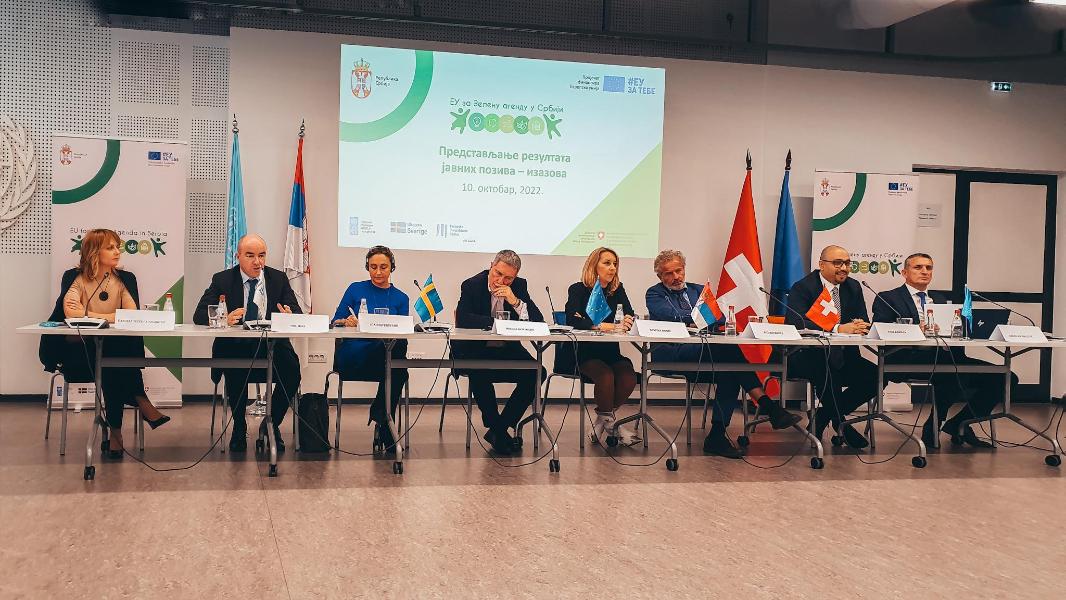
83 innovative solutions have been selected to receive technical and financial implementation support under the EU for the Green Agenda in Serbia initiative. In response to four public calls, local governments, companies, scientific research institutions and civil society organisations throughout Serbia submitted their environmentally friendly plans aiming to accelerate the green transformation, climate action and job creation. The United Nations Development Programme (UNDP) is implementing the initiative with the financial support of the European Union and in partnership with Serbia’s Ministry of Environmental Protection, EIB Global, the Swedish embassy and the government of Switzerland.
“As the EU climate bank, we see our role as a global driver of energy efficiency and climate action. This initiative is aligned with these ambitions, and we are glad to be able to assist the country in its transition towards a green and sustainable economic model. At the same time, we believe that innovation is the essence of any economic transition and this project can help demonstrate this by tackling a wide range of climate and environmental challenges, which will ultimately help Serbia and its people prosper,” said Paul Hickey, an EIB expert on urban and regional development.
The selected projects and teams will attend training courses and receive support from mentors with a view to making their innovative ideas ready for implementation. “In order to ensure financial support for as many innovative ideas as possible, UNDP will enable all selected teams to present their project ideas to commercial banks and the donor community,” said Acting Permanent Representative of UNDP in Serbia Anas Qarman.
“We expect that the allocation of national and donor funds for the implementation of innovative solutions submitted through these public calls will encourage other donors, as well as the financial and economic sector, to join us on the path of the green transformation of Serbia," added Assistant Minister of Environmental Protection Sandra Dokić.
The proposed ideas provide new or improved business models and technologies that will lead to more efficient use of resources and the reduction and reuse of waste. Their aim is to address specific climate challenges, such as increasing the share of renewable energy sources, improving air quality, and restoring forest ecosystems and green urban areas. “The solutions submitted show that there are many organisations in Serbia that want to invest in the green transition and be pioneers of this change in the Serbian economy and society," said First Secretary of the Swedish Embassy in Serbia Ida Reutersvard.
Head of the Cooperation Department of the Delegation of the European Union in Serbia Nikola Bertolini said that the investment needs for the selected projects were around €75 million, and welcomed this important step towards Serbia’s shift to a carbon-neutral economy. “On the way to climate neutrality, every effort is important! We have no time to lose; the whole planet is involved in the race to prevent catastrophic climate scenarios,” he said.
“With this contribution of $4.9 million and an additional $2.2 million specifically intended for decarbonisation, Switzerland joins the joint efforts of the government of Serbia, the donor community and the private sector in the fight against the climate change,” said Head of the Cooperation Department at the Embassy of Switzerland Richard Coley, a new partner in the project.
Green Agenda for the Western Balkans:
The Green Agenda for the Western Balkans is the growth strategy for the region adopted in 2020 that aims to tackle the challenges of climate change and green transition and help the Western Balkan countries to align their environmental regulations with the EU acquis. It is based on the European Green Deal and the related Economic and Investment Plan for the Western Balkans, entailing five priority areas: climate action, including decarbonisation, energy and mobility; the circular economy, addressing in particular waste, recycling, sustainable production and the efficient use of resources; biodiversity, aiming to protect and restore the natural wealth of the region; fighting air, water and soil pollution; and sustainable food systems and rural areas.